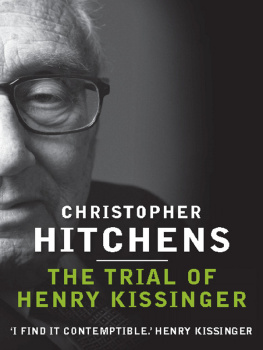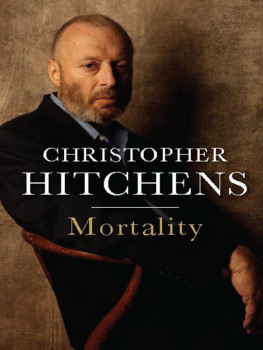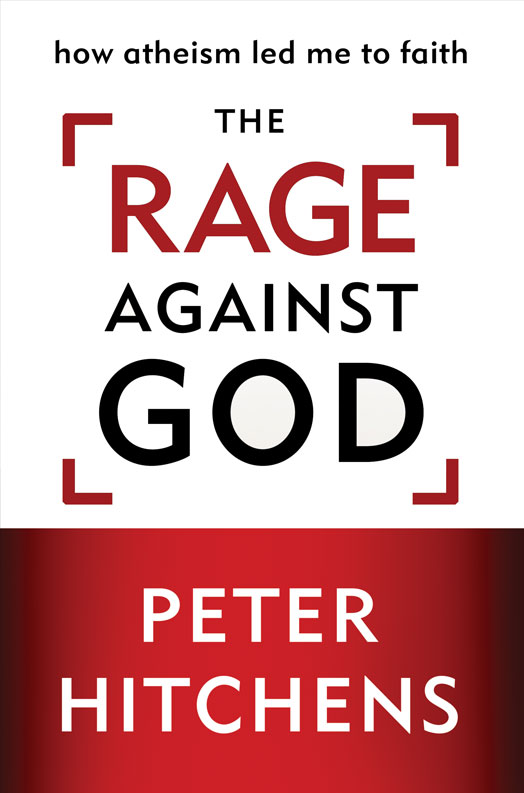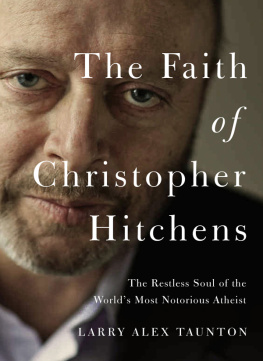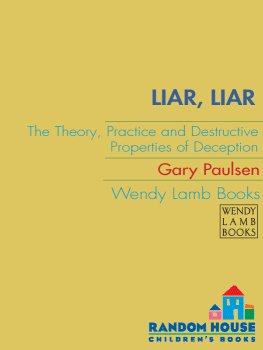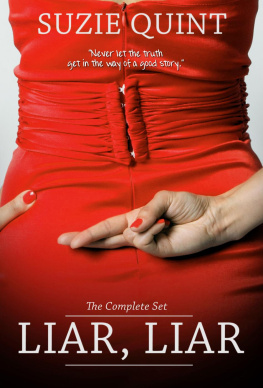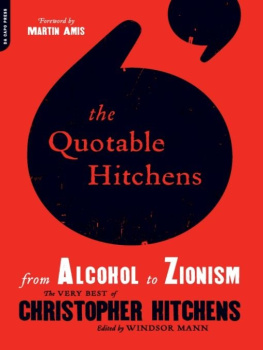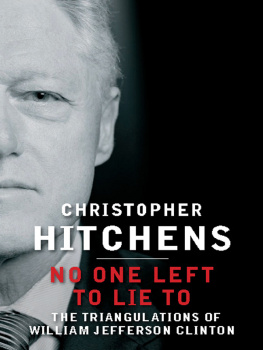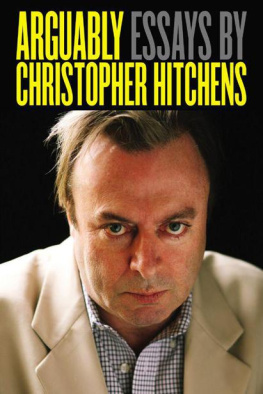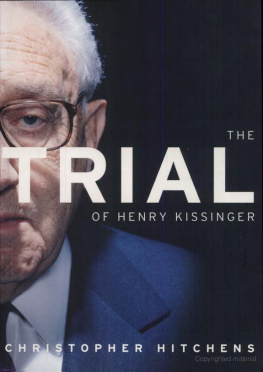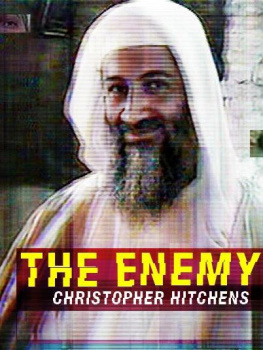
THE TRIAL OF
HENRY KISSINGER
ALSO BY CHRISTOPHER HITCHENS
BOOKS
Hostage to History: Cyprus from the Ottomans to Kissinger
Blood, Class and Nostalgia: Anglo-American Ironies
Imperial Spoils: The Curious Case of the Elgin Marbles
Why Orwell Matters
No One Left to Lie To: The Triangulations of William Jefferson Clinton
Letters to a Young Contrarian
The Trial of Henry Kissinger
Thomas Jefferson: Author of America
Thomas Paines Rights of Man: A Biography
God Is Not Great: How Religion Poisons Everything
The Portable Atheist
Hitch-22: A Memoir
Arguably: Essays
PAMPHLETS
Karl Marx and the Paris Commune
The Monarchy: A Critique of Britains Favorite Fetish
The Missionary Position: Mother Teresa in Theory and Practice
A Long Short War: The Postponed Liberation of Iraq
ESSAYS
Prepared for the Worst: Essays and Minority Reports
For the Sake of Argument
Unacknowledged Legislation: Writers in the Public Sphere
Love, Poverty and War: Journeys and Essays
COLLABORATIONS
James Callaghan: The Road to Number Ten (with Peter Kellner)
Blaming the Victims (edited with Edward Said)
When the Borders Bleed: The Struggle of the Kurds (photographs by Ed Kash)
International Territory: The United Nations (photographs by Adam Bartos)
Vanity Fairs Hollywood (with Graydon Carter and David Friend)
THE TRIAL
OF HENRY
KISSINGER
Christopher Hitchens

This edition first published in Australia and New Zealand by Allen & Unwin in 2012
Published in the United States by Twelve, an imprint of Grand Central Publishing, by arrangement with Verso, an imprint of New Left Books
Copyright Christopher Hitchens 2002
Foreword to this edition copyright Ariel Dorfman 2012
All rights reserved. No part of this book may be reproduced or transmitted in any form or by any means, electronic or mechanical, including photocopying, recording or by any information storage and retrieval system, without prior permission in writing from the publisher. The Australian Copyright Act 1968 (the Act) allows a maximum of one chapter or 10 per cent of this book, whichever is the greater, to be photocopied by any educational institution for its educational purposes provided that the educational institution (or body that administers it) has given a remuneration notice to Copyright Agency Limited (CAL) under the Act.
Allen & Unwin
Sydney, Melbourne, Auckland, London
83 Alexander Street
Crows Nest NSW 2065
Australia
Phone: (61 2) 8425 0100
Email: info@allenandunwin.com
Web: www.allenandunwin.com
Cataloguing-in-Publication details are available
from the National Library of Australia
www.trove.nla.gov.au
ISBN 978 1 74331 191 2
Printed and bound in Australia by Griffin Press
10 9 8 7 6 5 4 3 2 1

For the brave victims of Henry Kissinger,
whose example will easily outlive him,
and his reputation.
And for Joseph Heller, who saw it early
and saw it whole:
In Golds conservative opinion, Kissinger
would not be recalled in history as a Bismarck,
Metternich or Castlereagh but as an odious schlump
who made war gladly. (Good as Gold, 1976)
Contents
Foreword to the
New Edition
It was not long into our first conversation with Hitchcan it be thirty years ago?that the unctuous presence of Henry Kissinger made itself felt. The year must have been 1981, and my wife, Anglica, and I were in exile from a Chile terrorized by General Augusto Pinochet and Christopher had just arrived in Washington, DC, to write for TheNation, after a recent stint as a foreign correspondent on the luckless island of Cyprus. Cyprus and Chile, two countries joined in misfortune and sorrow and betrayal, hounded by the same man, the same statesman, the same war criminal who had been Nixons secretary of state.
I cant recall exactly the place where Anglica and I met Hitchit may have been Barbara Ehrenreichs apartment or at the always welcoming house of Saul Landaunor can I recollect the exact contours of our almost simultaneous diatribe against Kissinger that evening, but I like to think that in some glorious recess of Christophers febrile and extraordinary brain, he was already planning this book, starting to put on trial the despoiler of Chile and Cyprus. And lets not forget Cambodia and Vietnam and East Timor and the Kurdsthe Kurds, above all let us not ever forget the Kurds, because Christopher never did.
Over the years, more indictments like those of that first evening were sprinkled through our long and plentiful and often contentious friendship. Like true friends, we did not agree on everything, but Kissinger was always there to remind us of how deep our desire for justice ran; our conviction, his and mine, that if one could not physically bring a man responsible for genocide before a tribunal, there was always the written word to pin him to the wall and eviscerate his impunity. Neither of us thoughtat least I didntthat such a trial in the world of realpolitik and fawning media and obsequious politicians would ever be possible.
General Pinochets arrest in London in 1998 changed that. That a former head of state could be subjected to universal jurisdiction (a term that Christopher highlights in his opening remarks of this book) for crimes against humanity, that the decision to find sufficient reasons to extradite the former Chilean dictator to Spain had been approved by the several courts in London and confirmed by the Law Lords (an equivalent to the US Supreme Court), was undoubtedly the trigger that led to The Trial of HenryKissinger being written. If Pinochet, then why not Kissinger? Why not anyone whose dossier proved a conscious and systematic involvement in egregious human rights violations, no matter how influential that person might be? Or should the law only be applied to a land like Chile, with no nuclear weapons or bases strewn around the world, and not the United States, flexing its power and muscle?
The book itself is vintage Hitchens, in the tradition of Thomas Paine, one of his heroes: incisive, ironic, chock full of information, contemptuous of what the pundits might think, redolent with indignation and choice adjectives. But most crucial, what I now read behind the rant, many years later, is the same thing that struck me about Christopher in that very first conversation we had.
A topic that Hitch kept coming back to on that night in 1981, as he would often during the years ahead, was that of the missing of Chile, the desaparecidos, men and women abducted from the streets or their homes by the secret police and never heard of again, absent from the world as if they had never been born. We discussed at some length (it was my obsession then and still is) how this atrocity, along with affecting the bodies of those who had been kidnapped, devastated the lives of the relatives who could not find their beloved, who could not even bury their corpses or mourn an uncertain death.
Next page
